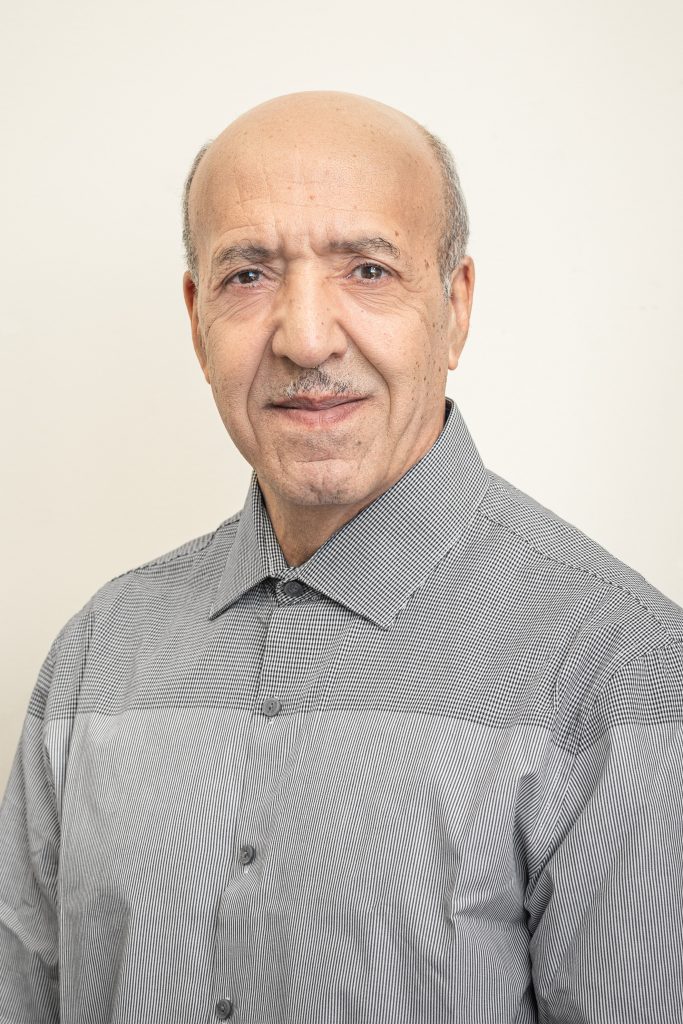Aucun résultat

Moulay Alaoui-Jamali’s team has contributed to the characterization of molecular switches by which tyrosine kinase receptors of the ErbB family promote cancer cell migration and invasion.
His laboratory discovered and cloned a novel member of the TRIP gene family of transcription factors called RBT/SERTAD, which encodes for an oncoprotein involved in the regulation of cell cycle (NIH Gene bank accession # AF192529 and AF317202) and whose chromosomal location is amplified/overexpressed in malignancies such as ovarian carcinomas.
Moulay Alaoui-Jamali’s laboratory is internationally known for investigating novel anticancer agents in in-vitro and in-vivo preclinical cancer models.
His current focus is to understand and target signalling pathways that drive early stage cancer cell invasion.
Moulay Alaoui-Jamali is Full Professor of Oncology and Medicine at the Faculty of Medicine, McGill University, Project Director at the Lady Davis Institute for Medical Research, and Leader of the Drug Discovery Group at the Segal Cancer Centre of the Jewish General Hospital. His research focuses on the biology of cancer progression to metastasis, anticancer drug pharmacology, and drug discovery.
The accumulation of genomic and proteomic databases for the complex metastatic disease, together with advances in technology platforms, have paved the way to increased molecular understanding of cellular targets essential for the spread of cancer beyond primary sites. Pr. Alaoui-Jamali’s team is exploiting newer technologies to identify, understand, and develop “smart” drugs against key invasive cancer cell targets for therapeutic intervention. This challenge is particularly demanding in the case of advanced cancer, where a large number of genetic changes affecting multiple cell regulatory pathways occur. Another interest of this team is to understand and tackle drug resistance mechanisms associated with relapses and often seen with most clinically used therapeutic agents.
Pr. Alaoui-Jamali’s research has been published in over 150 international peer-reviewed biomedical and medical oncology journals and honoured at several international conferences, including the American Association for Cancer Research, the American Society of Clinical Oncology, the Canadian Society of Otolaryngology, and the American Head and Neck Society. He serves on several national and international grant panels, the editorial boards of biomedical journals, and has edited books and book chapters related to the field of oncology science. His research has been supported by the Canadian Institutes for Health Research (CIHR), the Canadian Cancer Society (National Cancer Institute), the US Army Medical Research Initiative, the Quebec Breast Cancer and Prostate Cancer Foundations, the Fonds de recherches en santé du Québec, and the Cancer Research Society.
Pr. Alaoui-Jamali’s research relates to biology of cancer progression, drug resistance, cancer biomarkers, and novel therapeutics with a focus on breast, prostate, head and neck, and liver carcinomas.
Cancer is a complex disease that involves multiple mechanisms and routes affected by a variety of tissue microenvironment, host, and acquired factors. In this respect, Pr. Alaoui-Jamali’s group has contributed to the understanding of molecular pathways that drive early cancer cell progression to metastasis in the complex tissue microenvironment.
Pr. Alaoui-Jamali’s laboratory exploits novel technologies including functional and structural proteomics and bioinformatics to identify key therapeutic targets and develop selective agents for therapeutic intervention for advanced cancer.
Bijian K, Wernic D, Nivedha AK, Su J, Lim FPL, Miron CE, Amzil H, Moitessier N, Alaoui-Jamali MA. J Medicinal Chemistry(USA). 2022 Feb 24;65(4):3134-3150.
Chang CH, Bijian K, Wernic D, Su J, da Silva SD, Yu H, Qiu D, Asslan M, Alaoui-Jamali MA. Autophagy. 2019 Aug;15(8):1376-1390. doi: 10.1080/15548627.2019.1582951. Epub 2019 Mar 1. PMID: 30773992; PMCID: PMC6613893.
Carnielli CM, Macedo CCS, De Rossi T, Granato DC, Rivera C, Domingues RR, Pauletti BA, Yokoo S, Heberle H, Busso-Lopes AF, Cervigne NK, Sawazaki-Calone I, Meirelles GV, Marchi FA, Telles GP, Minghim R, Ribeiro ACP, Brandão TB, de Castro G Jr, González-Arriagada WA, Gomes A, Penteado F, Santos-Silva AR, Lopes MA, Rodrigues PC, Sundquist E, Salo T, da Silva SD, Alaoui-Jamali MA, Graner E, Fox JW, Coletta RD, Paes Leme AF. Nat Commun. 2018 Sep 5;9(1):3598. doi: 10.1038/s41467-018-05696-2. PMID: 30185791; PMCID: PMC6125363.
Xu Y, Bismar TA, Su J, Xu B, Kristiansen G, Varga Z, Teng L, Ingber DE, Mammoto A, Kumar R, Alaoui-Jamali MA. J Exp Med. 2010 Oct 25;207(11):2421-37. doi: 10.1084/jem.20100433. Epub 2010 Oct 11. PMID: 20937704; PMCID: PMC2964581.
Alaoui-Jamali MA, Bismar TA, Gupta A, Szarek WA, Su J, Song W, Xu Y, Xu B, Liu G, Vlahakis JZ, Roman G, Jiao J, Schipper HM. Cancer Res. 2009 Oct 15;69(20):8017-24. doi: 10.1158/0008-5472.CAN-09-0419. Epub 2009 Oct 6. PMID: 19808972.